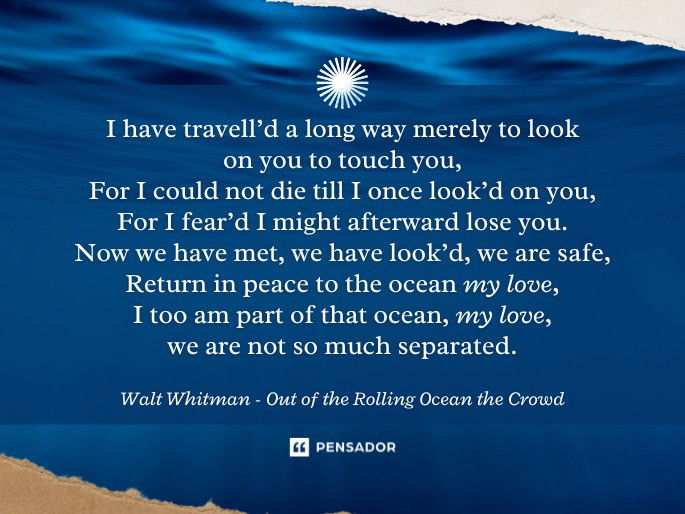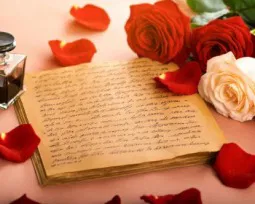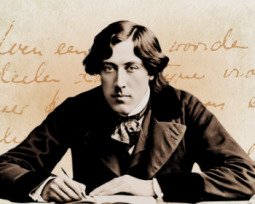Considered one of the greatest writers America has ever produced, Walt Whitman Jr. (1819-1892) was born on May 31, 1819, in New York. His formal education wasn't long as he had to quit school at the mere age of 11 and help his father make ends meet. From there, he worked as a Printer and a Journalist in the coming years which helped shape his role as a writer.
Walt Whitman is also known as the 'Father of free verse' because his groundbreaking collection Leaves of Grass broke away from traditional meter and rhyme schemes, paving the way for a more natural and expressive style of poetry. He has written around 160 poems and published 8 books before his death due to pleurisy.
O Captain! My Captain
Captain! my Captain! our fearful trip is done,
The ship has weather’d every rack, the prize we sought is won,
The port is near, the bells I hear, the people all exulting,
While follow eyes the steady keel, the vessel grim and daring;
But O heart! heart! heart!
the bleeding drops of red,
Where on the deck my Captain lies,
Fallen cold and dead.
Captain! my Captain! rise up and hear the bells;
Rise up—for you the flag is flung—for you the bugle trills,
For you bouquets and ribbon’d wreaths—for you the shores a-crowding,
For you they call, the swaying mass, their eager faces turning;
Here Captain! dear father!
This arm beneath your head!
It is some dream that on the deck,
You’ve fallen cold and dead.
My Captain does not answer, his lips are pale and still,
My father does not feel my arm, he has no pulse nor will,
The ship is anchor’d safe and sound, its voyage closed and done,
From fearful trip the victor ship comes in with object won;
Exult O shores, and ring O bells!
But I with mournful tread,
Walk the deck my Captain lies,
Fallen cold and dead.Walt Whitman
Song of Myself
1
I celebrate myself, and sing myself,
And what I assume you shall assume,
For every atom belonging to me as good belongs to you.I loafe and invite my soul,
I lean and loafe at my ease observing a spear of summer grass.My tongue, every atom of my blood, form'd from this soil, this air,
Born here of parents born here from parents the same, and their parents the same,
I, now thirty-seven years old in perfect health begin,
Hoping to cease not till death.Creeds and schools in abeyance,
Retiring back a while sufficed at what they are, but never forgotten,
I harbor for good or bad, I permit to speak at every hazard,
Nature without check with original energy.Walt Whitman

Out of the Rolling Ocean the Crowd
I have travell’d a long way merely to look on you to touch you,
For I could not die till I once look’d on you,
For I fear’d I might afterward lose you.
Now we have met, we have look’d, we are safe,
Return in peace to the ocean my love,
I too am part of that ocean, my love, we are not so much separatedWalt Whitman
Out of the Rolling Ocean the Crowd
Out of the rolling ocean the crowd came a drop gently to me,
Whispering, I love you, before long I die,
I have travell’d a long way merely to look on you to touch you,
For I could not die till I once look’d on you,
For I fear’d I might afterward lose you.
Now we have met, we have look’d, we are safe,
Return in peace to the ocean my love,
I too am part of that ocean, my love, we are not so much separated,
Behold the great rondure, the cohesion of all, how perfect!
But as for me, for you, the irresistible sea is to separate us,
As for an hour carrying us diverse, yet cannot carry us diverse forever;
Be not impatient – a little space – know you I salute the air, the ocean and the land,
Every day at sundown for your dear sake, my love.Walt Whitman
I Dream’d in a Dream
I DREAM'D in a dream, I saw a city invincible to the attacks of the
whole of the rest of the earth;
I dream'd that was the new City of Friends;
Nothing was greater there than the quality of robust love--it led the
rest;
It was seen every hour in the actions of the men of that city,
And in all their looks and words.Walt Whitman
To a Locomotive In Winter
Thee in thy panoply, thy measur’d dual throbbing and thy beat convulsive,
Thy black cylindric body, golden brass, and silvery steel,
Thy ponderous side-bars, parallel and connecting rods, gyrating, shuttling at thy sides,
Thy metrical, now swelling pant and roar, now tapering in the distance,
Thy great protruding head-light fix’d in front,
Thy long, pale, floating vapor-pennants, tinged with delicate purple,
The dense and murky clouds out-belching from thy smoke-stack,
Thy knitted frame, thy springs and valves, the tremulous twinkle of thy wheels,
Thy train of cars behind, obedient, merrily following,
Through gale or calm, now swift, now slack, yet steadily careering;
Type of the modern—emblem of motion and power—pulse of the continent,
For once come serve the Muse and merge in verse, even as here I see thee,
With storm and buffeting gusts of wind and falling snow,
By day thy warning ringing bell to sound its notes,
By night thy silent signal lamps to swing.
Fierce-throated beauty!
Roll through my chant with all thy lawless music, thy swinging lamps at night,
Thy madly-whistled laughter, echoing, rumbling like an earthquake, rousing all,
Law of thyself complete, thine own track firmly holding,
(No sweetness debonair of tearful harp or glib piano thine,)
Thy trills of shrieks by rocks and hills return’d,
Launch’d o’er the prairies wide, across the lakes,
To the free skies unpent and glad and strong.Walt Whitman
A Noiseless Patient Spider
A noiseless, patient spider,
I mark’d where on a little promontory it stood isolated,
Mark’d how to explore the vacant vast surrounding,
It launch’d forth filament, filament, filament, out of itself,
Ever unreeling them, ever tirelessly speeding them.And you O my soul where you stand,
Surrounded, detached, in measureless oceans of space,
Ceaselessly musing, venturing, throwing, seeking the spheres to connect them,
Till the bridge you will need be form’d, till the ductile anchor hold,
Till the gossamer thread you fling catch somewhere, O my soul.Walt Whitman
On the Beach at Night Alone
On the beach at night alone,
As the old mother sways her to and fro, singing her husky song,
As I watch the bright stars shining, I think a thought of the clef of the universes, and of the future.
A vast similitude interlocks all,
All spheres, grown, ungrown, small, large, suns, moons, planets,
All distances of place however wide,
All distances of time, all inanimate forms,
All souls, all living bodies though they be ever so different, or in different worlds,
All gaseous, watery, vegetable, mineral processes, the fishes, the brutes,
All men and women, me also,
All nations, colors, barbarisms, civilizations, languages,
All identities that have existed or may exist on this globe, or any globe,
All lives and deaths, all of the past, present, future,
This vast similitude spans them, and always has spann’d,
And shall forever span them and compactly hold and enclose them.Walt Whitman
I Hear America Singing
I hear America singing, the varied carols I hear,
Those of mechanics, each one singing his as it should be blithe and strong,
The carpenter singing his as he measures his plank or beam,
The mason singing his as he makes ready for work, or leaves off work,
The boatman singing what belongs to him in his boat, the deckhand singing on the steamboat deck,
The shoemaker singing as he sits on his bench, the hatter singing as he stands,
The wood-cutter’s song, the ploughboy’s on his way in the morning, or at noon intermission or at sundown,
The delicious singing of the mother, or of the young wife at work, or of the girl sewing or washing,
Each singing what belongs to him or her and to none else,
The day what belongs to the day—at night the party of young fellows, robust, friendly,
Singing with open mouths their strong melodious songs.Walt Whitman
In Paths Untrodden
In paths untrodden,
In the growth by margins of pond-waters,
Escaped from the life that exhibits itself,
From all the standards hitherto publish'd, from the pleasures, profits, conformities,
Which too long I was offering to feed my soul,
Clear to me now standards not yet publish'd, clear to me that my soul,
That the soul of the man I speak for rejoices in comrades,
Here by myself away from the clank of the world,
Tallying and talk'd to here by tongues aromatic,
No longer abash'd, (for in this secluded spot I can respond as I would not dare elsewhere,)
Strong upon me the life that does not exhibit itself, yet contains all the rest,
Resolv'd to sing no songs to-day but those of manly attachment,
Projecting them along that substantial life,
Bequeathing hence types of athletic love,
Afternoon this delicious Ninth-month in my forty-first year,
I proceed for all who are or have been young men,
To tell the secret of my nights and days,
To celebrate the need of comrades.Walt Whitman
As I Walk These Broad Majestic Days
As I walk these broad majestic days of peace,
(For the war, the struggle of blood finish'd, wherein, O terrific Ideal,
Against vast odds erewhile having gloriously won,
Now thou stridest on, yet perhaps in time toward denser wars,
Perhaps to engage in time in still more dreadful contests, dangers,
Longer campaigns and crises, labors beyond all others,)
Around me I hear that eclat of the world, politics, produce,
The announcements of recognized things, science,
The approved growth of cities and the spread of inventions.I see the ships, (they will last a few years,)
The vast factories with their foremen and workmen,
And hear the indorsement of all, and do not object to it.But I too announce solid things,
Science, ships, politics, cities, factories, are not nothing,
Like a grand procession to music of distant bugles pouring, triumphantly moving, and grander heaving in sight,
They stand for realities—all is as it should be.Then my realities;
What else is so real as mine?
Libertad and the divine average, freedom to every slave on the face of the earth,
The rapt promises and luminé of seers, the spiritual world, these centuries-lasting songs,
And our visions, the visions of poets, the most solid announcements of any.Walt Whitman
When I heard the learn’d Astronomer
When I heard the learn’d astronomer,
When the proofs, the figures, were ranged in columns before me,
When I was shown the charts and diagrams, to add, divide, and measure them,
When I sitting heard the astronomer where he lectured with much applause in the lecture-room,
How soon unaccountable I became tired and sick,
Till rising and gliding out I wander’d off by myself,
In the mystical moist night-air, and from time to time,
Look’d up in perfect silence at the stars.Walt Whitman
Beat! Beat! Drums!
Beat! beat! drums!—blow! bugles! blow!
Through the windows—through doors—burst like a ruthless force,
Into the solemn church, and scatter the congregation,
Into the school where the scholar is studying,
Leave not the bridegroom quiet—no happiness must he have now with his bride,
Nor the peaceful farmer any peace, ploughing his field or gathering his grain,
So fierce you whirr and pound you drums—so shrill you bugles blow.Beat! beat! drums!—blow! bugles! blow!
Over the traffic of cities—over the rumble of wheels in the streets;
Are beds prepared for sleepers at night in the houses? no sleepers must sleep in those beds,
No bargainers’ bargains by day—no brokers or speculators—would they continue?
Would the talkers be talking? would the singer attempt to sing?
Would the lawyer rise in the court to state his case before the judge?
Then rattle quicker, heavier drums—you bugles wilder blow.Beat! beat! drums!—blow! bugles! blow!
Make no parley—stop for no expostulation,
Mind not the timid—mind not the weeper or prayer,
Mind not the old man beseeching the young man,
Let not the child’s voice be heard, nor the mother’s entreaties,
Make even the trestles to shake the dead where they lie awaiting the hearses,
So strong you thump O terrible drums—so loud you bugles blow.Walt Whitman
America
Centre of equal daughters, equal sons,
All, all alike endear’d, grown, ungrown, young or old,
Strong, ample, fair, enduring, capable, rich,
Perennial with the Earth, with Freedom, Law and Love,
A grand, sane, towering, seated Mother,
Chair’d in the adamant of Time.Walt Whitman
The Wound-Dresser
1
An old man bending I come, among new faces,
Years looking backward resuming, in answer to children,
Come tell us, old man, as from young men and maidens that love me,
(Arous’d and angry, I’d thought to beat the alarum, and urge relentless war,
But soon my fingers fail’d me, my face droop’d and I resign’d myself,
To sit by the wounded and soothe them, or silently watch the dead;)
Years hence of these scenes, of these furious passions, these chances,
Of unsurpass’d heroes, (was one side so brave? the other was equally brave;)
Now be witness again, paint the mightiest armies of earth,
Of those armies so rapid, so wondrous, what saw you to tell us?
2
Lo, the batter’d and shatter’d,
Artillery’s shells and the prison,
Hospitals, (scenes I pass,) the hurt and wounded I pacify with soothing hand,
I sit by the restless all the dark night, some are so young,
Some suffer so much, I recall the experience sweet and sad,
(Many a soldier’s loving arms about this neck have cross’d and rested,
Many a soldier’s kiss dwells on these bearded lips.)
3
Come, sweet death! be persuaded O beautiful death!
In mercy come quickly.
From the stump of the arm, the amputated hand,
I undo the clotted lint, remove the slough, wash off the matter and blood,
Back on his pillow the soldier bends with curv’d neck and side-falling head,
His eyes are closed, his face is pale, he dares not look on the bloody stump,
And has not yet look’d on it.
I dress a wound in the side, deep, deep,
But a day or two more, for see the frame all wasted and sinking,
And the yellow-blue countenance see.
I dress the perforated shoulder, the foot with the bullet wound,
Cleanse the one with a gnawing and putrid gangrene, so sickening, so offensive,
While the attendant stands behind aside me holding the tray and pail.
I am faithful, I do not give out,
The fractur’d thigh, the knee, the wound in the abdomen,
These and more I dress with impassive hand, (yet deep in my breast a fire, a burning flame.)
4
Thus in silence in dreams’ projections,
Returning, resuming, I thread my way through the hospitals,
The hurt and wounded I pacify with soothing hand,
I sit by the restless all the dark night, some are so young,
Some suffer so much, I recall the experience sweet and sad,
(Many a soldier’s loving arms about this neck have cross’d and rested,
Many a soldier’s kiss dwells on these bearded lips.)
I Sing the Body Electric
1
I sing the body electric,
The armies of those I love engirth me and I engirth them,
They will not let me off till I go with them, respond to them,
And discorrupt them, and charge them full with the charge of the soul.
Was it doubted that those who corrupt their own bodies conceal themselves?
And if those who defile the living are as bad as they who defile the dead?
And if the body does not do fully as much as the soul?
And if the body were not the soul, what is the soul?2
The love of the body of man or woman balks account, the body itself balks account,
That of the male is perfect, and that of the female is perfect.The expression of the face balks account,
But the expression of a well-made man appears not only in his face,
It is in his limbs and joints also, it is curiously in the joints of his hips and wrists,
It is in his walk, the carriage of his neck, the flex of his waist and knees, dress does not hide him,
The strong sweet quality he has strikes through the cotton and broadcloth,
To see him pass conveys as much as the best poem, perhaps more,
You linger to see his back, and the back of his neck and shoulder-side.The sprawl and fullness of babes, the bosoms and heads of women, the folds of their dress, their style as we pass in the street, the contour of their shape downwards,
The swimmer naked in the swimming-bath, seen as he swims through the transparent green-shine, or lies with his face up and rolls silently to and fro in the heave of the water,
The bending forward and backward of rowers in row-boats, the horseman in his saddle,
Girls, mothers, house-keepers, in all their performances,
The group of laborers seated at noon-time with their open dinner-kettles, and their wives waiting,
The female soothing a child, the farmer’s daughter in the garden or cow-yard,
The young fellow hoeing corn, the sleigh-driver guiding his six horses through the crowd,
The wrestle of wrestlers, two apprentice-boys, quite grown, lusty, good-natured, native-born, out on the vacant lot at sundown after work,
The coats vests, and caps thrown down, the embrace of love and resistance,
The upper-hold and under-hold, the hair rumpled over and blinding the eyes;
The march of firemen in their own costumes, the play of masculine muscle through clean-setting trowsers and waist-straps,
The slow return from the fire, the pause when the bell strikes suddenly again, and the listening on the alert,
The natural, perfect, varied attitudes, the bent head, the curv’d neck and the counting;
Such-like I love—I loosen myself, pass freely, am at the mother’s breast with the little child,
Swim with the swimmers, wrestle with wrestlers, march in line with the firemen, and pause, listen, count.3
I knew a man, a common farmer, the father of five sons,
And in them the fathers of sons, and in them the fathers of sons.This man was of wonderful vigor, calmness, beauty of person,
The shape of his head, the pale yellow and white of his hair and beard, the immeasurable meaning of his black eyes, the richness and breadth of his manners,
These I used to go and visit him to see, he was wise also,
He was six feet tall, he was over eighty years old, his sons were massive, clean, bearded, tan-faced, handsome,
They and his daughters loved him, all who saw him loved him,
They did not love him by allowance, they loved him with personal love,
He drank water only, the blood show’d like scarlet through the clear-brown skin of his face,
He was a frequent gunner and fisher, he sail’d his boat himself, he had a fine one presented to him by a ship-joiner, he had fowling-pieces presented to him by men that loved him,
When he went with his five sons and many grand-sons to hunt or fish, you would pick him out as the most beautiful and vigorous of the gang,
You would wish long and long to be with him, you would wish to sit by him in the boat that you and he might touch each other.4
I have perceiv’d that to be with those I like is enough,
To stop in company with the rest at evening is enough,
To be surrounded by beautiful, curious, breathing, laughing flesh is enough,
To pass among them, or touch any one, or rest my arm ever so lightly round his or her neck for a moment, what is this then?
I do not ask any more delight, I swim in it as in a sea.There is something in staying close to men and women and looking on them, and in the contact and odor of them, that pleases the soul well,
All things please the soul, but these please the soul well.5
This is the female form,
A divine nimbus exhales from it from head to foot,
It attracts with fierce undeniable attraction,
I am drawn by its breath as if I were no more than a helpless vapor, all falls aside but myself and it,
Books, art, religion, time, the visible and solid earth, and what was expected of heaven or fear’d of hell, are now consumed,
Mad filaments, ungovernable shoots play out of it, the response likewise ungovernable,
Hair, bosom, hips, bend of legs, negligent falling hands all diffused, mine too diffused,
Ebb stung by the flow and flow stung by the ebb, love-flesh swelling and deliciously aching,
Limitless limpid jets of love hot and enormous, quivering jelly of love, white-blow and delirious juice,
Bridegroom night of love working surely and softly into the prostrate dawn,
Undulating into the willing and yielding day,
Lost in the cleave of the clasping and sweet-flesh’d day.This the nucleus—after the child is born of woman, man is born of woman,
This the bath of birth, this the merge of small and large, and the outlet again.Be not ashamed women, your privilege encloses the rest, and is the exit of the rest,
You are the gates of the body, and you are the gates of the soul.The female contains all qualities and tempers them,
She is in her place, and moves with perfect balance,
She is all things duly veil’d, she is both passive and active,
She is to conceive daughters as well as sons, and sons as well as daughters.As I see my soul reflected in nature,
As I see through a mist, one with inexpressible completeness and beauty,
See the bent head and arms folded over the breast, the female I see.6
The male is not less the soul nor more, he too is in his place,
He too is all qualities, he is action and power,
The flush of the known universe is in him,
Scorn becomes him well, and appetite and defiance become him well,
The wildest largest passions, bliss that is utmost, sorrow that is utmost become him well, pride is for him,
The full-spread pride of man is calming and excellent to the soul,
Knowledge becomes him, he likes it always, he brings everything to the test of himself,
Whatever the survey, whatever the sea and the sail, he strikes soundings at last only here,
(Where else does he strike soundings except here?)The man’s body is sacred and the woman’s body is sacred,
No matter who it is, it is sacred—is it the meanest one in the laborers’ gang?
Is it one of the dull-faced immigrants just landed on the wharf?
Each belongs here or anywhere just as much as the well-off, just as much as you,
Each has his or her place in the procession.(All is a procession,
The universe is a procession with measured and perfect motion.)Do you know so much yourself that you call the meanest ignorant?
Do you suppose you have a right to a good sight, and he or she has no right to a sight?
Do you think matter has cohered together from its diffused float, and the soil is on the surface, and water runs and vegetation sprouts for you, and not for him and her?7
A man’s Body at auction;
(I help the auctioneer—the sloven does not half know his business.)Gentlemen, look on this wonder!
Whatever the bids of the bidders, they cannot be high enough for it;
For it, the globe lay preparing quintillions of years, without one animal or plant;
For it, the revolving cycles truly and steadily roll’d.In this head the all-baffling brain;
In it and below it, the makings of heroes.Examine these limbs, red, black, or white—they are so cunning in tendon and nerve;
They shall be stript, that you may see them.Exquisite senses, life-lit eyes, pluck, volition,
Flakes of breast-muscle, pliant backbone and neck, flesh not flabby, good-sized arms and legs,
And wonders within there yet.Within there runs his blood—the same old blood!
The same red-running blood!There swells and jets a heart—there all passions, desires, reachings, aspirations;
(Do you think they are not there because they are not express’d in parlors and lecture-rooms?)This is not only one man—this is the father of those who shall be fathers in their turns;
In him the start of populous states and rich republics;
Of him countless immortal lives, with countless embodiments and enjoyments.How do you know who shall come from the offspring of his offspring through the centuries?
(Who might you find you have come from yourself, if you could trace back through the centuries?)8
A woman’s Body at auction!
She too is not only herself—she is the teeming mother of mothers;
She is the bearer of them that shall grow and be mates to the mothers.Have you ever loved the Body of a woman?
Have you ever loved the Body of a man?Do you not see that these are exactly the same to all, in all nations and times, all over the earth?
If any thing is sacred, the human body is sacred,
And the glory and sweet of a man is the token of manhood untainted;
And in man or woman, a clean, strong, firm-fibred body, is more beautiful than the most beautiful face.Have you seen the fool that corrupted his own live body? or the fool that corrupted her own live body?
For they do not conceal themselves, and cannot conceal themselves.9
O my Body! I dare not desert the likes of you in other men and women, nor the likes of the parts of you;
I believe the likes of you are to stand or fall with the likes of the Soul, (and that they are the Soul;)
I believe the likes of you shall stand or fall with my poems—and that they are my poems,
Man’s, woman’s, child, youth’s, wife’s, husband’s, mother’s, father’s, young man’s, young woman’s
poems;
Head, neck, hair, ears, drop and tympan of the ears;
Eyes, eye-fringes, iris of the eye, eyebrows, and the waking or sleeping of the lids;
Mouth, tongue, lips, teeth, roof of the mouth, jaws, and the jaw-hinges;
Nose, nostrils of the nose, and the partition;
Cheeks, temples, forehead, chin, throat, back of the neck, neck-slue;
Strong shoulders, manly beard, scapula, hind-shoulders, and the ample side-round of the chest.Upper-arm, armpit, elbow-socket, lower-arm, arm-sinews, arm-bones,
Wrist and wrist-joints, hand, palm, knuckles, thumb, forefinger, finger-joints, finger-nails,
Broad breast-front, curling hair of the breast, breast-bone, breast-side,
Ribs, belly, back-bone, joints of the back-bone,
Hips, hip-sockets, hip-strength, inward and outward round, man-balls, man-root,
Strong set of thighs, well carrying the trunk above,
Leg-fibres, knee, knee-pan, upper-leg, under-leg,
Ankles, instep, foot-ball, toes, toe-joints, the heel;
All attitudes, all the shapeliness, all the belongings of my or your body, or of any one’s body, male or female,
The lung-sponges, the stomach-sac, the bowels sweet and clean,
The brain in its folds inside the skull-frame,
Sympathies, heart-valves, palate-valves, sexuality, maternity,
Womanhood, and all that is a woman, and the man that comes from woman,
The womb, the teats, nipples, breast-milk, tears, laughter, weeping, love-looks, love-perturbations and
risings,
The voice, articulation, language, whispering, shouting aloud,
Food, drink, pulse, digestion, sweat, walk, swim, climb,
Self-esteem, curiosity, mission, estimation,
Naught is going to be lost,
It is the glory of the Body of man or woman, it is the meanest part of any one of you, and the meanest
part of any one of you is worthy of the whole.You darkenings, weeping, and hoarse despair,
You shall touch all;
You shall be proof of my poems, this day and ever.By my life-lumps! becoming already a creator,
Putting myself here and now to the ambush’d womb of the shadows!Walt Whitman
Recommended Articles







